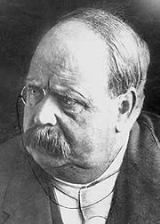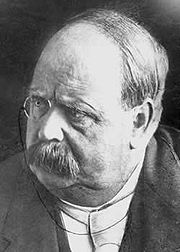
Free Trade Party
Encyclopedia
The Free Trade Party which was officially known as the Australian Free Trade and Liberal Association, also referred to as the Revenue Tariff Party in some states and renamed the Anti-Socialist Party in 1906, was an Australia
n political party, formally organised between 1889 and 1909. It advocated the abolition of protectionism
, especially protective tariffs and other restrictions on trade, arguing that this would create greater prosperity for all. However, many members also advocated use of minimal tariffs for government revenue
purposes only.
The party was centred on New South Wales
, where its leaders were Sir Henry Parkes
and Sir George Reid
. It dominated New South Wales colonial politics before federation
.
In the elections for the first Commonwealth Parliament
, the Free Traders, who campaigned in some states as the "revenue tariff party", formed the second largest group in the Australian House of Representatives
, with 25 seats. Reid became the Parliament's first Opposition Leader with William McMillan
as his deputy, later becoming Prime Minister
in 1904-05. Joseph Cook
became deputy leader of the party on McMillan's retirement in 1903.
A separate Tasmanian Revenue Tariff Party contested the 1903 federal election in Tasmania and won two seats but also sat and merged with the Free Trade Party in federal parliament.
After the question of tariffs had largely been settled, Reid cast around for another cause to justify his party's existence. He settled on opposition to socialism
, criticising both the Australian Labor Party
and the support offered to it by the Protectionist Party
, led by Alfred Deakin
. The Free Trade Party was eventually renamed the Anti-Socialist Party (ASP) before the 1906 federal election. The Labor Party and the FTP/ASP continued to grow in electoral strength at the expense of the Protectionist vote. Some Protectionists continued their exodus to Labor and the ASP.
Reid retired in 1908, with the party leadership passed to Joseph Cook
, who agreed to merge with the Protectionists to become the Commonwealth Liberal Party
in 1909.

Australia
Australia , officially the Commonwealth of Australia, is a country in the Southern Hemisphere comprising the mainland of the Australian continent, the island of Tasmania, and numerous smaller islands in the Indian and Pacific Oceans. It is the world's sixth-largest country by total area...
n political party, formally organised between 1889 and 1909. It advocated the abolition of protectionism
Protectionism
Protectionism is the economic policy of restraining trade between states through methods such as tariffs on imported goods, restrictive quotas, and a variety of other government regulations designed to allow "fair competition" between imports and goods and services produced domestically.This...
, especially protective tariffs and other restrictions on trade, arguing that this would create greater prosperity for all. However, many members also advocated use of minimal tariffs for government revenue
Revenue
In business, revenue is income that a company receives from its normal business activities, usually from the sale of goods and services to customers. In many countries, such as the United Kingdom, revenue is referred to as turnover....
purposes only.
The party was centred on New South Wales
New South Wales
New South Wales is a state of :Australia, located in the east of the country. It is bordered by Queensland, Victoria and South Australia to the north, south and west respectively. To the east, the state is bordered by the Tasman Sea, which forms part of the Pacific Ocean. New South Wales...
, where its leaders were Sir Henry Parkes
Henry Parkes
Sir Henry Parkes, GCMG was an Australian statesman, the "Father of Federation." As the earliest advocate of a Federal Council of the colonies of Australia, a precursor to the Federation of Australia, he was the most prominent of the Australian Founding Fathers.Parkes was described during his...
and Sir George Reid
George Reid (Australian politician)
Sir George Houstoun Reid, GCB, GCMG, KC was an Australian politician, Premier of New South Wales and the fourth Prime Minister of Australia....
. It dominated New South Wales colonial politics before federation
Federation of Australia
The Federation of Australia was the process by which the six separate British self-governing colonies of New South Wales, Queensland, South Australia, Tasmania, Victoria and Western Australia formed one nation...
.
In the elections for the first Commonwealth Parliament
Parliament of Australia
The Parliament of Australia, also known as the Commonwealth Parliament or Federal Parliament, is the legislative branch of the government of Australia. It is bicameral, largely modelled in the Westminster tradition, but with some influences from the United States Congress...
, the Free Traders, who campaigned in some states as the "revenue tariff party", formed the second largest group in the Australian House of Representatives
Australian House of Representatives
The House of Representatives is one of the two houses of the Parliament of Australia; it is the lower house; the upper house is the Senate. Members of Parliament serve for terms of approximately three years....
, with 25 seats. Reid became the Parliament's first Opposition Leader with William McMillan
William McMillan (Australian politician)
Sir William McMillan KCMG was an Australian politician and businessman. Alfred Deakin said he was a "thoughtful, educated businessman, narrow and cold after the manner of the Manchester School … business-like in manner and incisive in debate".McMillan was born in Derry, Ireland and...
as his deputy, later becoming Prime Minister
Prime Minister of Australia
The Prime Minister of the Commonwealth of Australia is the highest minister of the Crown, leader of the Cabinet and Head of Her Majesty's Australian Government, holding office on commission from the Governor-General of Australia. The office of Prime Minister is, in practice, the most powerful...
in 1904-05. Joseph Cook
Joseph Cook
Sir Joseph Cook, GCMG was an Australian politician and the sixth Prime Minister of Australia. Born as Joseph Cooke and working in the coal mines of Silverdale, Staffordshire during his early life, he emigrated to Lithgow, New South Wales during the late 1880s, and became General-Secretary of the...
became deputy leader of the party on McMillan's retirement in 1903.
A separate Tasmanian Revenue Tariff Party contested the 1903 federal election in Tasmania and won two seats but also sat and merged with the Free Trade Party in federal parliament.
After the question of tariffs had largely been settled, Reid cast around for another cause to justify his party's existence. He settled on opposition to socialism
Socialism
Socialism is an economic system characterized by social ownership of the means of production and cooperative management of the economy; or a political philosophy advocating such a system. "Social ownership" may refer to any one of, or a combination of, the following: cooperative enterprises,...
, criticising both the Australian Labor Party
Australian Labor Party
The Australian Labor Party is an Australian political party. It has been the governing party of the Commonwealth of Australia since the 2007 federal election. Julia Gillard is the party's federal parliamentary leader and Prime Minister of Australia...
and the support offered to it by the Protectionist Party
Protectionist Party
The Protectionist Party was an Australian political party, formally organised from 1889 until 1909, with policies centred on protectionism. It argued that Australia needed protective tariffs to allow Australian industry to grow and provide employment. It had its greatest strength in Victoria and in...
, led by Alfred Deakin
Alfred Deakin
Alfred Deakin , Australian politician, was a leader of the movement for Australian federation and later the second Prime Minister of Australia. In the last quarter of the 19th century, Deakin was a major contributor to the establishment of liberal reforms in the colony of Victoria, including the...
. The Free Trade Party was eventually renamed the Anti-Socialist Party (ASP) before the 1906 federal election. The Labor Party and the FTP/ASP continued to grow in electoral strength at the expense of the Protectionist vote. Some Protectionists continued their exodus to Labor and the ASP.
Reid retired in 1908, with the party leadership passed to Joseph Cook
Joseph Cook
Sir Joseph Cook, GCMG was an Australian politician and the sixth Prime Minister of Australia. Born as Joseph Cooke and working in the coal mines of Silverdale, Staffordshire during his early life, he emigrated to Lithgow, New South Wales during the late 1880s, and became General-Secretary of the...
, who agreed to merge with the Protectionists to become the Commonwealth Liberal Party
Commonwealth Liberal Party
The Commonwealth Liberal Party was a political movement active in Australia from 1909 to 1916, shortly after federation....
in 1909.

See also
- LiberalismLiberalismLiberalism is the belief in the importance of liberty and equal rights. Liberals espouse a wide array of views depending on their understanding of these principles, but generally, liberals support ideas such as constitutionalism, liberal democracy, free and fair elections, human rights,...
- Contributions to liberal theoryContributions to liberal theoryIndividual contributors to classical liberalism and political liberalism are associated with philosophers of the Enlightenment. Liberalism as a specifically named ideology begins in the late 18th century as a movement towards self-government and away from aristocracy...
- Liberalism worldwideLiberalism worldwideThis article gives information on liberalism in diverse countries around the world. It is an overview of parties that adhere more or less to the ideas of political liberalism and is therefore a list of liberal parties around the world....
- List of liberal parties
- Liberal democracyLiberal democracyLiberal democracy, also known as constitutional democracy, is a common form of representative democracy. According to the principles of liberal democracy, elections should be free and fair, and the political process should be competitive...
- Liberalism in AustraliaLiberalism in AustraliaLiberalism in Australia dates back to the earliest pioneers of the area, and has maintained a strong foothold to this day.-Introduction:The earliest pioneers of the federation movement, men such as Alfred Deakin and Samuel Griffith, were generally self-described "liberals"...

